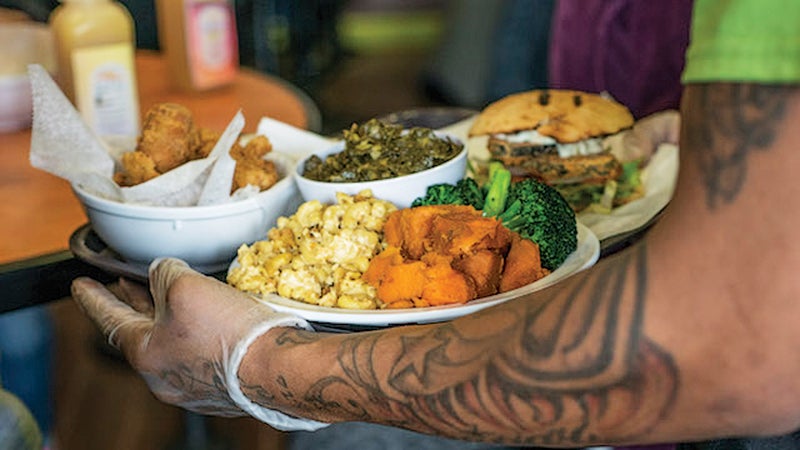Vegan Soul Food at NuVegan Café in Washington DC

Marriage turned Vernon Woodland into a vegan.
The chef at and co-owner of the Washington, D.C., eatery NuVegan Café (formerly Woodland’s Vegan Bistro) grew up eating like other African-American youth in the city’s black neighborhoods: meals centered on chicken, beef, and pork. And there was plenty of macaroni and cheese.
His wife, Mickiyah Woodland, who spent her childhood years in Bermuda and in D.C., learned to cook at a young age in the vegan restaurants that her parents operated.
When the Woodlands, both 34, married 14 years ago, “she converted me over,” says Vernon, who trained at the New England Culinary Institute. “This whole vegan lifestyle was new to me and to a lot of people, especially in this area.”
A new wave of African-American vegans
Now the couple is among an increasing number of black vegan enthusiasts, from megawatt celebrities like husband-and-wife recording artists Jay Z and Beyoncé to ordinary moms intent on better family nutrition.
Plant-based cuisine is featured at black-owned restaurants and in cookbooks by black authors, like 2015 James Beard Foundation award winner Bryant Terry, chef-in-residence at the Museum of the African Diaspora in San Francisco.
Online, a host of African-American–centric venues tout the vegan lifestyle, including BlacksGoingVegan.com, BrownVegan.com, and SistahVegan.com. On Facebook, thousands follow the pages Black Vegan Love and Beautiful Black Vegan Women.
The Woodlands serve vegan adaptations of the beloved mac and cheese, and barbecue roast and fried chicken, plus a slew of veggie sides, salads, and juices.
“We kind of made a name for ourselves as a soul-food vegan restaurant,” Vernon says proudly.
Patrons include producer and businessman Russell Simmons, and one of the best-known advocates—black or white—for a diet that shuns animal products and manufactured food in favor of fruits and vegetables: activist and comedian Dick Gregory.
Gregory’s 1974 book Dick Gregory’s Natural Diet for Folks Who Like to Eat: Cookin’ With Mother Nature remains popular. It influenced Darrin Wilkerson, a mental-health counselor in Los Angeles who administers the Facebook pages Beautiful Black Vegan Women and Positive Strong Black Vegan Men.
“We are all learning at the same time,” says Wilkerson, 48, who also launched the Black Vegan Community on Facebook to share vegan experiences.
The switch to plant-based foods
Wilkerson’s mom owned a fish market on the Jersey Shore, so he ate mostly seafood as a child. But for the past 10 years, he’s stuck to a plant-based diet.
He finds support in the social group Vegans of Color. If it seems odd that a man is behind Beautiful Black Vegan Women, consider Wilkerson’s goal: generational change. “My whole point is to educate the women because they make the food decisions in the household. They are in control of the diet and nutritional value,” he says.
Woodland learned from his wife, and in 2009 they took over the former Everlasting Life Café, changing the name to Woodland’s Vegan Bistro in 2013. It was rebranded as NuVegan Café this year.
Their adapted comfort foods hooked locals who were being told by their doctors to eat healthier in order to combat health conditions—hypertension, diabetes, and obesity—prevalent among blacks (and the U.S. population as a whole).
The Woodlands own a second NuVegan Café in College Park, MD, that caters to a younger crowd.
“Our whole mission,” Vernon says, “is to change the perception of what vegan food is.”
By Theresa Walker